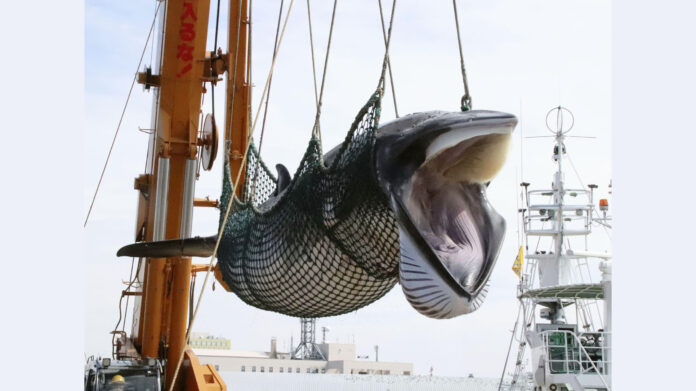
By Gemma Handy
Almost two dozen wildlife protection groups from across the world have signed a letter to Prime Minister Gaston Browne condemning the country’s efforts to lift a four-decade ban on commercial whaling.
The letter sent on Saturday lambasts the government for submitting a resolution at last week’s meeting of the International Whaling Committee (IWC) in Slovenia to reopen formal debate on the matter – before subsequently denying it in a statement widely recirculated by regional media.
Fury erupted among environmentalists worldwide when Antigua and Barbuda’s IWC Commissioner called for the moratorium on hunting and killing whales for meat to be reconsidered.
Commissioner Daven Joseph said the twin island nation believed no maritime species should be given special protection unless deemed threatened. He said research indicated that numbers of humpback and minke whales were healthy enough for some commercial whaling to resume.
But notes subsequently released by Cabinet last Thursday claiming the ministerial body had made no such decision caused confusion and further discord.
Saturday’s letter signed by 22 NGOs including Cetacean Society International, Humane Society International, OceanCare and Dolphin Connection noted the “marked contrast” between the Cabinet statement and the resolution requesting steps “aimed towards the lifting of the moratorium and the orderly development of the whaling industry”.
“The title speaks for itself and so does its content. This resolution was originally put forward by Antigua and Barbuda with St Lucia joining as a co-sponsor at the meeting,” the conservationists’ letter states.
Ultimately the resolution was not put to the vote meaning the moratorium – in effect since 1986 – remains in place.
“But the representative from Antigua and Barbuda announced that they would continue to work on it and bring it back to the next commission meeting in 2024,” the letter continues.
“It is hard to understand why the delegation continues to act as a promoter of the legalisation and resumption of commercial whaling when Antigua and Barbuda has no history of commercial whaling nor has it announced any interest to undertake commercial whaling.”
Further anger ensued at the IWC meeting when a group of 16 countries – including Antigua and Barbuda – walked out of a conference preventing the commission from agreeing a proposal from Latin American countries to create a South Atlantic whale sanctuary.
While the majority of IWC member states have already voted in support of the proposal, a three-quarter majority was needed to ratify it.
The letter goes on to point out incongruity between the country’s pro-whaling stance and other environmental matters.
Just last month PM Browne gave a strident speech to the United Nations General Assembly in which he dubbed climate change the biggest common threat to mankind and demanded the world do more to protect the planet.
Whales play a key role in the health of oceans where they help provide up to half of the world’s oxygen.
The NGOs’ letter says the groups are perturbed by what they claim were deliberate efforts to stop the sanctuary going ahead.
“We, the undersigned organisations, are very concerned by this and other initiatives by your country within the IWC, especially when Antigua and Barbuda acts with a clear and strong voice towards conserving the ocean in other fora,” the letter says.
It goes on to compliment the nation for supporting efforts to reduce plastic pollution, among other things.
“Considering these excellent examples of Antigua and Barbuda’s commitment on marine protection and climate change issues on the global stage, we kindly request that you provide clarifications to our organisations and to the general public regarding the role and mandate of Antigua and Barbuda at the IWC,” it adds.
Prime Minister Browne has been approached for comment. None was forthcoming up to news time. Commissioner Joseph has indicated his agreement to provide wider clarity via a radio interview.
The ban on hunting whales was introduced to combat their plummeting numbers. Many fear if it was lifted it would spell disaster for the creatures which are already battling the impacts of climate change, death as bycatch from fishing, ship strikes and ocean pollution.
Antigua and Barbuda, along with other countries in the region, has long backed whaling in a show of support for its ally Japan which has a tradition of such. Japan has invested heavily in Caribbean fisheries infrastructure on the understanding that recipients will support the Asian nation on the international stage.
Japan submitted an unsuccessful proposal to lift the whaling moratorium at the last IWC meeting in 2018. It has since left the commission and is no longer bound by the restriction.
Despite the controversy surrounding this year’s meeting, there was some positive news. A resolution on combatting plastic pollution was adopted by consensus. That was welcomed by marine protection group OceanCare which said it would help “whales and dolphins survive in a marine world infiltrated by massive plastic pollution”.
Overall the outcome of the meeting was “mixed”, said OceanCare’s Nicolas Entrup.
“Despite desperate and scandalous tactics by pro-whaling nations, clearly directed by Japan, the IWC did manage a small step forward toward a more conservation oriented organisation, and – most importantly – kept the moratorium on commercial whaling in place,” he added.
